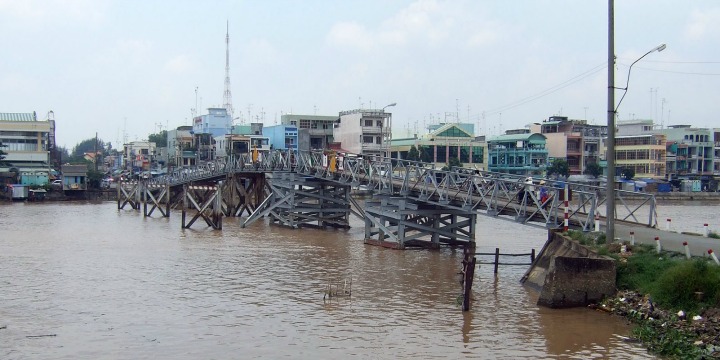Vietnam and Israel: The First 25 Years
 by Alon Levkowitz
by Alon Levkowitz
Israel and Vietnam just marked their first 25 years of diplomatic relations. There is now a strong potential for further economic and diplomatic improvement that could provide significant benefits to both sides.
On July 12, 1993 — more than 25 years ago — Israel established diplomatic relations with Vietnam. Continued good relations can offer both countries significant economic and political benefits.
Vietnam is a member of the Association of Southeast Asian Nations (ASEAN), an organization of 10 states and almost 650 million people. Israel has diplomatic and economic relations with several members of the ASEAN, a body that has developed into an important economic player in Southeast Asia over the years.
Diplomatic and economic relations with Vietnam allow Israel to improve trade not just with other ASEAN members with which it has diplomatic relations, but also with states with which it does not. Vietnam has become a channel through which Israel can trade with the Muslim world in the region, without facing political and ideological barriers. Improving trade with Vietnam will also help Israel gain access to other states beyond Southeast Asia that Hanoi has diplomatic relations with.
Vietnam is the third-largest market in the region and its economy is growing fast. It is looking for economic projects that will allow it to offer work to its rapidly expanding population. Vietnam sees Israel as a model for cooperation in both low- and high-tech industries, particularly in the agriculture sector, which combines low- and high-tech. Vietnam’s high-tech agriculture technology cooperation with Israel is valuable to Hanoi, which seeks to improve the sector in order to increase agricultural exports.
Current trade between Israel and Vietnam is around $1.1 billion, with the potential to reach $1.5 billion. Vietnamese officials estimate that in the coming years, trade between Israel and Vietnam could double to $3 billion. And trade between Israel and Vietnam is not limited to the civilian sector. The two states cooperate in the defense sector as well. The Israeli defense advantage offers valuable solutions to the security challenges Vietnam faces.
This is one of the reasons why Israel and Vietnam are negotiating a free trade agreement (FTA). (Israel is also in the final rounds of FTA negotiations with China and South Korea.) Jerusalem and Hanoi see the FTA as a platform that will allow both Israel and Vietnam to increase trade with other Asian states.
Israeli and Vietnamese economic, diplomatic, and administrative delegations visit one another’s countries frequently to find opportunities to increase trade. Last year, Israeli President Reuven Rivlin visited Vietnam with a large delegation of Israeli businessmen, a strong indicator of the importance Israel places on relations with Vietnam. And Hanoi recently sent a delegation to Israel to learn how Israel’s “start-up nation” ethos could be implemented back home.
Israeli-Vietnamese relations have huge economic and diplomatic potential that should be exploited, including in the more complicated and delicate political-diplomatic arena.
Dr. Alon Levkowitz, a research associate at the Begin-Sadat Center for Strategic Studies, is an expert on East Asian security, the Korean Peninsula, and Asian international organizations. BESA Center Perspectives Papers, such as this one, are published through the generosity of the Greg Rosshandler Family.
 Police Stop Anti-Zionist Agitators From Accessing Florida University President’s Home as Students Revolt Nationwide
Police Stop Anti-Zionist Agitators From Accessing Florida University President’s Home as Students Revolt Nationwide Nearly One in Five Young People Sympathize With Hamas, 29% Say US Should Reduce or End Alliance With Israel: Poll
Nearly One in Five Young People Sympathize With Hamas, 29% Say US Should Reduce or End Alliance With Israel: Poll Ilhan Omar Silent After Daughter’s Arrest, Suspension for Role in Columbia University Anti-Israel Protest
Ilhan Omar Silent After Daughter’s Arrest, Suspension for Role in Columbia University Anti-Israel Protest Cultural Center Backed by Iran’s Revolutionary Guard Plans to Produce Films About Attack on Israel
Cultural Center Backed by Iran’s Revolutionary Guard Plans to Produce Films About Attack on Israel How Does Ilhan Omar Really Feel About Iran?
How Does Ilhan Omar Really Feel About Iran? This Passover, Combine Respect for Tradition with the Courage to Innovate
This Passover, Combine Respect for Tradition with the Courage to Innovate Israel’s Iran Attack Carefully Calibrated After Internal Splits, US Pressure
Israel’s Iran Attack Carefully Calibrated After Internal Splits, US Pressure Palestinian Cameramen Exposed in New Footage Documenting Oct. 7 Atrocities Side by Side with Terrorists
Palestinian Cameramen Exposed in New Footage Documenting Oct. 7 Atrocities Side by Side with Terrorists US Money to Convicted Terrorists; US Training to Aspiring Terrorists
US Money to Convicted Terrorists; US Training to Aspiring Terrorists Man Arrested in Paris After Iran Consulate Incident
Man Arrested in Paris After Iran Consulate Incident




 Man Arrested in Paris After Iran Consulate Incident
Man Arrested in Paris After Iran Consulate Incident US Money to Convicted Terrorists; US Training to Aspiring Terrorists
US Money to Convicted Terrorists; US Training to Aspiring Terrorists Palestinian Cameramen Exposed in New Footage Documenting Oct. 7 Atrocities Side by Side with Terrorists
Palestinian Cameramen Exposed in New Footage Documenting Oct. 7 Atrocities Side by Side with Terrorists Israel’s Iran Attack Carefully Calibrated After Internal Splits, US Pressure
Israel’s Iran Attack Carefully Calibrated After Internal Splits, US Pressure This Passover, Combine Respect for Tradition with the Courage to Innovate
This Passover, Combine Respect for Tradition with the Courage to Innovate